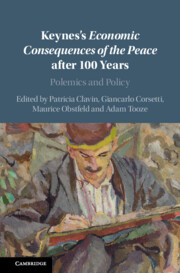Book contents
- Keynes’s Economic Consequences of the Peace after 100 Years
- Keynes’s Economic Consequences of the Peace after 100 Years
- Copyright page
- Contents
- Plates
- Figures
- Tables
- Contributors
- Preface
- Acknowledgements
- 1 Lessons of Keynes’s Economic Consequences in a Turbulent Century
- 2 The Making of a Classic: Keynes and the Origins of The Economic Consequences of the Peace
- 3 Keynes’s Economic Consequences (1919)
- 4 “Too Bad to Be True”: Swedish Economists on Keynes’s The Economic Consequences of the Peace and German Reparations, 1919–29
- 5 Revisionism as Intellectual-Political Vindication, or the French Receptions of Consequences after the Two World Wars (1919–1946)
- 6 Between Cambridge, Paris, and Amsterdam
- 7 Keynes, the Transfer Problem, and Reparations
- 8 The Speculative Consequences of the Peace
- 9 Why Was Keynes Opposed to Reparations and a Carthaginian Peace?
- 10 One Case Where The Economic Consequences of the Peace Mattered
- 11 Keynes and International Trade Politics after the First World War
- 12 Gold, International Monetary Cooperation, and the Tripartite Agreement of 1936
- 13 Exchange Rates, Tariffs and Prices in 1930s Britain
- 14 “Unusual, Unstable, Complicated, Unreliable and Temporary”: Reinterpreting the Ebb and Flow of Globalization
- 15 Keynes’s Arc of Discovery
- 16 Keynes, The Economic Consequences of the Peace, and Popular Perceptions of the First World War
- Index
- Plate Section (PDF Only)
- References
2 - The Making of a Classic: Keynes and the Origins of The Economic Consequences of the Peace
Published online by Cambridge University Press: 14 December 2023
- Keynes’s Economic Consequences of the Peace after 100 Years
- Keynes’s Economic Consequences of the Peace after 100 Years
- Copyright page
- Contents
- Plates
- Figures
- Tables
- Contributors
- Preface
- Acknowledgements
- 1 Lessons of Keynes’s Economic Consequences in a Turbulent Century
- 2 The Making of a Classic: Keynes and the Origins of The Economic Consequences of the Peace
- 3 Keynes’s Economic Consequences (1919)
- 4 “Too Bad to Be True”: Swedish Economists on Keynes’s The Economic Consequences of the Peace and German Reparations, 1919–29
- 5 Revisionism as Intellectual-Political Vindication, or the French Receptions of Consequences after the Two World Wars (1919–1946)
- 6 Between Cambridge, Paris, and Amsterdam
- 7 Keynes, the Transfer Problem, and Reparations
- 8 The Speculative Consequences of the Peace
- 9 Why Was Keynes Opposed to Reparations and a Carthaginian Peace?
- 10 One Case Where The Economic Consequences of the Peace Mattered
- 11 Keynes and International Trade Politics after the First World War
- 12 Gold, International Monetary Cooperation, and the Tripartite Agreement of 1936
- 13 Exchange Rates, Tariffs and Prices in 1930s Britain
- 14 “Unusual, Unstable, Complicated, Unreliable and Temporary”: Reinterpreting the Ebb and Flow of Globalization
- 15 Keynes’s Arc of Discovery
- 16 Keynes, The Economic Consequences of the Peace, and Popular Perceptions of the First World War
- Index
- Plate Section (PDF Only)
- References
Summary
Why didKeynes an exceedingly well connected young man with his feet very well planted in the English establishment,decide to take the risk of writing such an explosive book like The Economic Consequences of the Peace in 1919? After all, others had their doubts about Versailles; butnone went public;and ifor when theydid,it was certainly not to criticizethe peace settlementor the peacemakersin such a vitriolic fashion. SowhatledKeynes to write a book likeThe Economic Consequences of the Peace? What was his purpose in doing so? Who did he think he was writing it for?Was it his last word on the subjector was it – as Keynes believed at the time – merely the first step in a longer struggle to effectively render the economic parts of the Treaty invalid? Finally, why was the volumethe great success it turned out to be at the time, and whyis it still being debated today by both admirers and critics alike?
Keywords
- Type
- Chapter
- Information
- Keynes's Economic Consequences of the Peace after 100 YearsPolemics and Policy, pp. 57 - 81Publisher: Cambridge University PressPrint publication year: 2024



